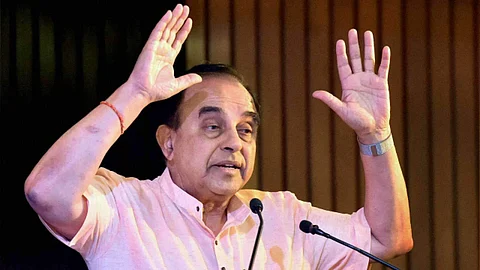

Every Indian language has a huge proportion of Sanskrit in it, including Tamil, which has 40 per cent of Sanskrit, Bengali has, even more, Malayalam has much more, said Dr Subramanian Swamy, speaking about the relevance of Sanskrit as a language, Hindi and the three language policy in the National Education Policy that have been in the spotlight for the last week. Swamy was speaking at The New Indian Express' series of virtual conversations called e-expressions on Tuesday.
He added that all of this pointed to a crisis in identity. "We must learn what our true identity is. Based on DNA studies we are all one people, regardless of what caste we belong to, which region, which religion...there is no Aryan-Dravidian theory. Every Indian language has a huge proportion of Sanskrit in it, including Tamil, which has 40% of Sanskrit, Bengali has, even more, Malayalam has much more. Every language has a Sanskrit vocabulary. Over a period of time if Hindi becomes more and more Sanskritised, as is required under the Constitution, please read Article 351 which says that the vocabulary of Hindi shall principally be from the Sanskrit language. We must develop it to the point where Hindi and Sanskrit are indistinguishable."
The new NEP document says Sanskrit will be mainstreamed but with strong offerings. "Due to its vast and significant contributions and literature across genres and subjects, its cultural significance, and its scientific nature, rather than being restricted to single-stream Sanskrit Pathshalas and Universities, Sanskrit will be mainstreamed with strong offerings in school - including as one of the language options in the three-language formula - as well as in higher education," states the policy.
The new NEP also proposes an "early implementation of the three-language formula to promote multilingualism" from school level. This has laid the foundation for numerous debates across states and parties in the country. However, the document also adds that there will be greater flexibility in the three-language formula, and no language will be imposed on any State. The document adds the three-language formula will continue to be implemented "while keeping in mind the Constitutional provisions, aspirations of the people, regions, and the Union, and the need to promote multilingualism as well as promote national unity".
